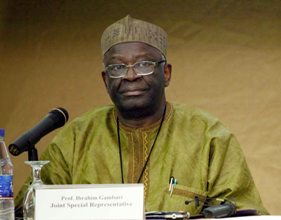UNAMID chief warns of north-south affect over Darfur, demands access to war zones
November 14, 2010 (KHARTOUM) – The recent flare-up of fighting between the Sudanese government and rebels in Darfur as well as tension along shared borders with south Sudan has exacerbated the security situation in Darfur, the head of the UN-AU peacekeeping mission in the region said on Sunday.

Ibrahim Gambari, who heads the hybrid peacekeeping mission known as UNAMID, told reporters in a press conference at Rotana Hotel in the capital Khartoum yesterday that he was “deeply concerned” about the renewal of violence in the region, urging the belligerent parties to immediately cease hostilities.
“I call upon all parties to refrain from further offensive military action and respect international humanitarian law,” Gambari said.
In the past weeks, Darfur region witnessed a spike in fighting between government forces on one side, and rebels from the Justice and Equality Movement (JEM) and the Sudan Liberation Movement led by Abdel-Wahid
Al-Nur on the other side.
The increase in violence comes as Sudan inches closer to holding a politically sensitive vote in January 2011 on the full independence of its semi-autonomous region of south Sudan from the north. The plebiscite is stipulated by a 2005 peace deal that ended Africa’s longest war between the Muslim-Arab north and the Christian-African south.
North and south Sudan have recently traded accusations of exhibiting an aggressive military posture along shared borders and supporting each others’ rebels.
On Thursday, South Sudan army the SPLA said that militias associated with north Sudan are acting in a provocative manner with the intent of breaching the permanent ceasefire between the two sides.
Similarly, north Sudan on Friday accused south Sudan army of aiding JEM rebels who clashed with government forces near Al-Meirem which abuts south Sudan’s state of Bahri al-Ghazal.
South Sudan said on Saturday that north Sudan army “accidently” dropped a bomb inside its territories as it was conducting an aerial bombardment against Darfur rebels.
Gambari voiced fears that “old alignment” between south Sudan leaders and Darfur rebels could be “rekindled” and result in further complication of the situation in Darfur.
The peacekeeping chief further warned that armed incidents along north-south borders shared borders could extend to affect Darfur.
“We are also concerned about the spillover effect of the north-south border and the armed incidents occurring there, particularly in the no man’s land between south of Sudan and south of Darfur,” he said.
However, he later said that his mission had devised “a contingency plan” to counter any violence resulting from tension between north and south Sudan.
“That’s why UNMIS and UNAMID have developed contingency plans,” he added.
Gambari also said that UNAMID needs to gain “unimpeded” access to all areas affected by recent fighting in order to assist the population there.
On Darfur peace process, Gamabari said that the UN-AU Chief Mediator for Darfur Djibril Bassole had held a “good” meeting with JEM leader Khalil Ibrahim, reiterating his calls on JEM and SLM-Nur to join Darfur peace talks in the Qatari capital of Doha.
Sudan Tribune took Gambari aside and asked him about the latest developments regarding the case of the six Darfur refugees who are under UNAMID custody and sought by the Sudanese government on accusations of instigating last July’s violent clashes in Kalma displacement camp between supporters and opponents of Darfur peace talks.
Gambari said that the situation in this particular case was “under control” and that UNAMID was working very closely with the Sudanese authorities in order to reach what he called “a win-win outcome.”
He elaborated that the ideal win-win outcome would be a one that respects the sovereignty of Sudan and assures the UN that the wanted IDPs would receive a proper trial observed by UNAMID, access to attorney and immunity from capital punishment.
Darfur region came to the fore of international agendas in 2003 when a harsh counterinsurgency campaign by Khartoum government against rebel groups created one of the worst humanitarian situations in recent history.
According to UN estimates, the conflict killed 300.000 people and displaced more than 2 million.
(ST)

DASODIKO
UNAMID chief warns of north-south affect over Darfur, demands access to war zones
Since the root causes of the conflict in Darfur are not yet addressed, then the war will continue to include Khartoum not just boarders between the North and the South Sudan.
I will like to tell to Ibrahim Gambarai that he will one day cry like a baby seeing his friend Bashir defeated inside Khartoum very soon. I am Sudanese and I know where the train is heading.